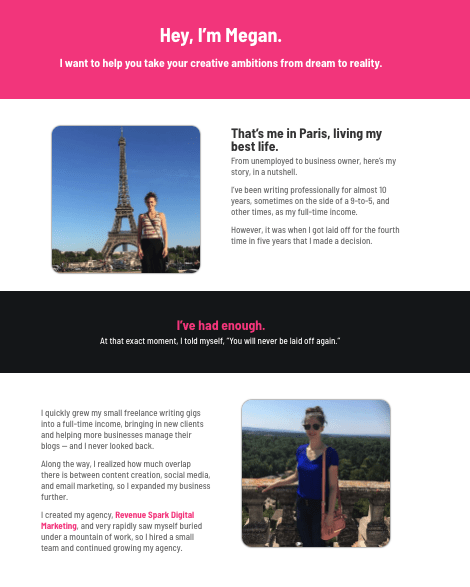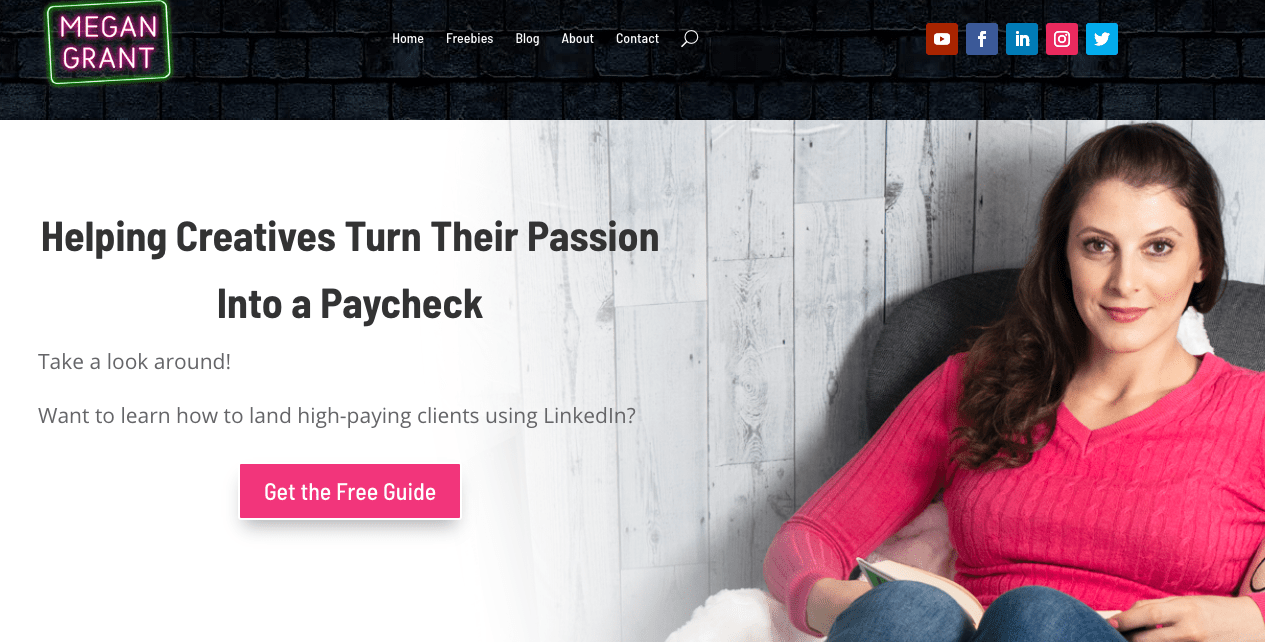We’re writers. Not web developers. Regardless, your freelance writer website is a representation of what kind of professional you are.
Thankfully, these days, there are content management systems (or CMS) that make it easy for those of us who are less tech-savvy to get an attractive website up quickly, and on the cheap, too. Think of Wix and WordPress .
So, that essentially removes the barrier of not being a web developer. You don’t need to be. Hooray!
But! There are still many other aspects of their freelance writer website that many people can and do mess up. Let’s talk about those mistakes and what you can be doing to avoid or fix them.
6 Reasons Your Freelance Writer Website Isn’t Working
1. You Focus on the Personal, Not the Professional
Write this down: Your freelance writer website is not. your. personal. blog!
You can’t treat it like one.
Even the blog page shouldn’t be where you write about your personal life. You shouldn’t be writing about your personal life on this website, period. Instead, use the blog to showcase examples of your work. (More on that a little later.)
The instant you decide you want to be a freelance writer, you’re deciding that you want to be a business owner. Your website should reflect that. This means your business (not you as an individual) should have a homepage, your services, a contact page, and a blog with samples.
The one place where it’s okay to get personal is your About Me page. But even then, remember that potential clients are going to see this. Present yourself in the most professional light possible.
Here’s my About page. I talk about my background and threw in a few pictures, too.

The next point goes along with this but deserves its own shout-out.
2. Your Freelance Writer Website Isn’t Optimized to Sell
I know that many of us (if not most of us), turn to writing for a paycheck because writing is our passion. But here’s the thing: Potential clients aren’t going to pay you because you’re passionate. They don’t really care about that.
Sorry. :-\
You can be passionate about something and totally suck at it. I’m passionate about arts and crafts, but most of what I make looks like a preschooler did it.
When you make your freelance writer website all about how passionate you are about writing, you completely fail to build a website that sells. And this is going to be mandatory if you want to make real money doing this.
Writing is no longer just your passion. It’s your paycheck. This means that you need a professional business website that highlights your services and clearly conveys how you can help people — just like any other business.
And this brings me to my next point.
3. You Focus on Features and Forget Benefits
This is often overlooked, but it’s so, so important.
Features and benefits are two different things. A feature is an aspect of the services you offer. A benefit is what the client gets out of it. Here’s an example.
Feature: SEO and keyword research
Benefit: Better rankings in Google and more website traffic
Which one do you think the client is going to care about more? What will speak to them more?
The benefit.
They’re going to want to know what they get out of working with you, so you always need to be answering that question. What’s in it for them?
There’s absolutely room to talk about features! But it shouldn’t be the first thing people see, and it shouldn’t be the sole focus. Instead, highlight the benefits that clients get from working with you, and then explain how you accomplish these benefits.
4. Your Freelance Writer Website Has No Obvious Call-to-Action
If you think that people visiting your freelance writer website will just magically know what to do next, you would be wrong.
You have to tell them what to do. Literally.
Do you want them to send you a message on your website? Contact you for a free consultation? Whatever you want them to do after visiting you online, tell them. This is what a call-to-action (CTA) is.
Take my website for example. As soon as you land on my homepage, I hit you with a CTA. I tell you to get my free guide. (Go do it! Right now!)

If I had left that button out, the one that says “Enroll in My Course,” I can guarantee you there would be way less traffic going to my course page.
And it’s not just website content, either. CTAs are a game-changer for email marketing and social media, too.
Don’t take my word for it, though. Here are some (rather mind-blowing) stats about CTAs that will undoubtedly win you over:
- Adding a CTA to your Facebook page could increase the click-through rate by a whopping 285%.
- Emails with a single CTA see a 371% increase in clicks and a 1,617% increase in sales.
- 90% of people who read your headline will also read your CTA.
If your freelance writer website doesn’t have a call-to-action, you’re missing out on a huge opportunity to continue engaging with potential clients.
5. Your Writing Samples Cover a Bunch of Random Topics
You’ve done your homework here, right? NO? Stop and read this blog about what makes a good freelance writing niche , and then watch this video.
All caught up? Okay, great.
So, here’s the thing. Some people might tell you that your entire freelance writer website should cater to your niche. Personally, while I think that this might be beneficial for some of us, I don’t believe that’s going to be the case for everyone.
But! Here’s what I can tell you.
On the blog page of your business website, where you will keep your samples, you samples should be geared to your niche.
When you’re communicating with a potential client, they will more than likely ask to see samples of your work. What do you do if you don’t have any?! This is why you publish your own. Also, it means that you don’t have to wait for someone to hire you to write in order to be able to show off your skillz to potential clients. Bonus.
(Side note: This is how you can start getting paid to write without any experience…)
Heck, even if you do have samples published elsewhere, it’s never a bad idea to put content that you 100% control up on your own website, where you can do anything with it that you please.
“But What If I Have More Than One Niche?”
Great question.
Remember that with most content management systems – including WordPress, which is what I use — you can create content without actually publishing it to your site. In other words, people won’t be able to see it unless you send them the link to that exact page.
Let’s say you’re a finance writer. But because you’re also incredibly passionate about parenting, you also start working in that niche. Understandably, you wouldn’t want to publish a parenting-related blog in a sea of finance-related blogs.
So, publish the content but leave it off of your website. Problem solved!
BTW, you can also make pages password-protected.
6. You Give All Your Rates Upfront
This is a hotly debated topic: Should you put your freelancing rates on your website?
Some people emphatically argue yes. Get it all out there and get it over with. That way, you can immediately weed out the people who won’t pay you what you want.
I totally understand this, but here’s the problem.
People are so incredibly price-conscious that seeing those dollar signs can immediately trigger bad feelings. BUT, oftentimes, all it takes is one phone call to get a potential client to understand that you’re an investment, and that you’re worth every penny.
But if you put your rates on your website and quickly turn these people off, you’ll never have that opportunity to at least talk to them.
A good compromise is to put what your rates start at, and then leave it at that. For example, “Monthly rates start at $1000.” This way, you’ll still weed out those people looking to pay you $200 a month but not people who might have the budget for you. People will have at least a vague idea of what to expect in terms of money.
The Bottom Line
I know that after this information dump, it’s probably hypocritical to tell you not to stress about your freelance writer website. But as careful as you should be with it, you really shouldn’t stress. Focus on progress, not perfection.
Your website is going to evolve no matter what. I’m actually in the process of redoing mine right now. To be clear, someone much better with websites is redoing mine right now.
It’s okay not to be perfect.
The bottom line is that you need to present yourself as a professional, an expert, a business owner — because you are!
Freebie alert: Aside from using my website, I also use LinkedIn to land a TON of clients. I made a free guide on how I do it. You can grab that here.